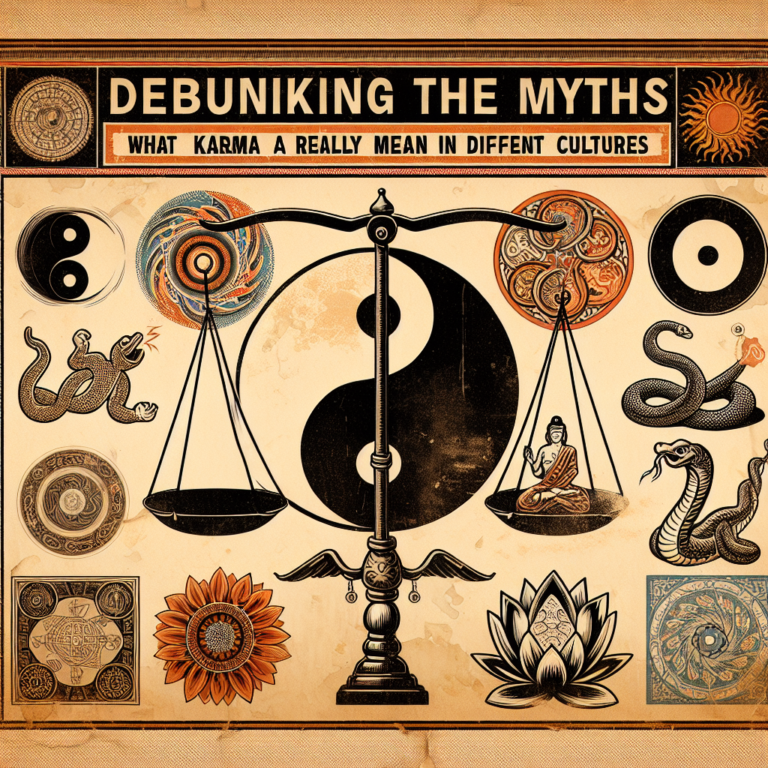Karma is an ancient concept rooted in various Eastern philosophies, particularly Hinduism and Buddhism. At its core, karma refers to the idea of cause and effect, suggesting that every action we take has corresponding consequences. In recent years, this age-old belief has gained traction in popular culture, inspiring various headlines that capture its essence.
In this article, we will explore the multifaceted implications of karma-related headlines, shedding light on their significance in our daily lives and societal narratives. Additionally, we will address some frequently asked questions about karma, helping to clarify this complex idea.
Understanding Karma: A Brief Overview
The term "karma" originates from the Sanskrit word "karman," meaning "action" or "deed." In spiritual contexts, karma is seen as the ethical dimension of actions and their repercussions. It suggests that good deeds can lead to favorable outcomes, while harmful actions may result in negative consequences. This law of moral causation asserts that we are responsible for our actions, shaping our destinies through our choices.
Karma is not limited to the actions of an individual but can also extend to collective actions and intentions. For instance, the ethical decisions made by a community, organization, or society can lead to outcomes that affect not only the present but also future generations.
Karma-Related Headlines in Popular Culture
As the concept of karma permeates mainstream discourse, various headlines and catchphrases have emerged, resonating with audiences and stimulating thought. Here are some noteworthy karma-related headlines that have surfaced in recent years:
"What Goes Around Comes Around": This popular saying encapsulates the essence of karma, suggesting that one’s actions will eventually circle back to them. It serves as a reminder to be mindful of our behaviors and their potential repercussions.
"Karma: The Universal Leveler?": This headline prompts discussions about how karma intersects with social justice. Many believe that karma can serve as a corrective force, ensuring that people receive their just deserts, despite the current state of inequality and injustice.
"Karma in the Digital Age": With the rise of social media, this headline highlights how actions online can have both immediate and far-reaching effects. From cyberbullying to viral kindness, the digital landscape has transformed the way we perceive and experience karma.
"Karma and Relationships: When Good Deeds Backfire": This headline addresses the complexity of interpersonal dynamics. Sometimes, the altruistic intentions of one party may not yield the expected results, leading to misunderstandings or hurt feelings.
- "Is Karma Real? A Scientific Perspective": This title invites scrutiny of karma through the lens of modern science and psychology. Can our understanding of karma coexist with scientific principles, or does it belong exclusively to the realm of spiritual belief?
The Role of Karma in Personal Growth
Karma serves as a significant motivator in personal development. Recognizing the potential consequences of our actions encourages individuals to act more thoughtfully and compassionately. Here are a few ways in which karma can influence personal growth:
Accountability: Embracing the concept of karma fosters a sense of responsibility for one’s actions. Acknowledging that our deeds influence not only ourselves but also others can lead to a more conscientious and ethical approach to life.
Empathy: Understanding karma promotes empathy. By realizing that everyone is on their unique journey shaped by their past actions, we can cultivate a more compassionate perspective toward others, recognizing their struggles and experiences.
Mindfulness: The principle of karma encourages mindfulness in our decision-making. Being aware of the potential long-term effects of our actions can lead to more intentional choices aligned with our values and goals.
- Healing and Forgiveness: Karma can also contribute to emotional healing. By recognizing that negative experiences may be part of a larger karmic cycle, individuals can find closure and forgiveness, not only for others but for themselves as well.
Karma and Social Commentary
The concept of karma also serves as a lens for examining societal issues. Many narratives surrounding karma delve into matters like justice, retribution, and morality, challenging individuals to reflect on the collective implications of their actions. Here are some aspects of social commentary related to karma:
Justice and Accountability: Karma can be viewed as a natural form of justice. When people witness wrongdoings going unpunished, the idea of karma offers some solace, suggesting that the universe will eventually set things right.
Environmental Responsibility: Today’s headlines often link karma to environmentalism, highlighting the idea that our treatment of the planet will determine its future health. This serves as a call to action for sustainable practices and respect for nature.
Karma and Wealth Inequality: The discussion surrounding karma also encompasses issues of wealth distribution. Some argue that those who acquire wealth at the expense of others will ultimately face the consequences of their actions, promoting discussions about ethics in business.
- Cultural Narratives: Cultural practices and storytelling revolve around the themes of karma, illustrating its relevance across diverse communities. Many folktales and parables emphasize the importance of good deeds, reinforcing the notion that our actions do matter.
Frequently Asked Questions about Karma
1. What is the origin of the word karma?
Karma is derived from the Sanskrit word "karman," which means "action" or "deed." It is rooted in ancient Indian philosophies such as Hinduism and Buddhism.
2. Does karma only apply in a spiritual sense?
While karma is often discussed in spiritual contexts, it can also apply to ethical and moral principles in everyday life. The idea of cause and effect can resonate with various aspects of actions and consequences, regardless of belief systems.
3. Can karma affect future lives?
In the belief systems that incorporate reincarnation, such as Hinduism and Buddhism, karma is believed to influence future lives. Positive actions may lead to favorable rebirths, while negative actions can create adverse circumstances.
4. How can I cultivate good karma?
To cultivate good karma, focus on positive actions and intentions. Acts of kindness, compassion, and integrity can foster a positive karmic relationship, benefiting you and those around you.
5. Is karma always immediate?
Karma does not necessarily manifest immediately. Sometimes, consequences may take time to materialize, and the effects of actions may be felt long after the initial deed.
6. Can I change my karma?
Yes, individuals have the power to change their karma by making conscious choices. Engaging in positive actions, seeking forgiveness, and pursuing personal growth can all contribute to altering one’s karmic path.
In conclusion, karma remains a relevant and powerful concept, influencing personal behavior and societal narratives alike. Through an understanding of karma, individuals can navigate their actions with mindfulness, empathy, and a deeper sense of responsibility, shaping both their lives and the world around them. As we continue to engage with this timeless principle, we are reminded that our choices matter, echoing through the fabric of our existence.
It seems like you’re looking for a prompt, but I need a bit more context to assist you effectively. Are you looking for a writing prompt, a discussion topic, or something else entirely? Let me know how I can help!, #KarmaRelated #Headlines, #KarmaRelated #Headlines, 1736681135, karma-related-headlines





